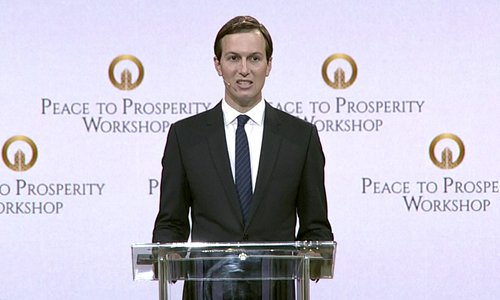HOME >> OPINION
Deal of the Century or a Barmecidal feast?
By Shu Meng Source:Global Times Published: 2019/7/2 18:38:40

At the two-day Peace to Prosperity economics conference last week in Bahrain's capital city Manama, the US unveiled an economic plan as part of the "Deal of the Century" apparently aimed at Israeli-Palestinian peace.
Under the plan, the US will make the region a global business model. From a contribution of $50 billion, proposed infrastructure and business projects in the West Bank and Gaza will receive $27.5 billion and over $20 billion will be used to support Palestinians registered as refugees in Arab states.
An emphasis on Palestinian living environment will also be a concern. The White House said the plan will "create more than one million Palestinian jobs - bringing the unemployment rate down to single digits, in line with developed economies - and reduce the poverty rate by 50 percent."
The deal includes investments in healthcare, power, water, agriculture and education. Even local cuisine and Ramallah ice cream will join efforts to promote tourism.
This US notion is plausible as continuous development is a guarantee of long-term peace. However, the "Deal of the Century" ignores the interdependence of peace and development as peace is also an essential foundation for development.
In the context of the long-standing Israeli-Palestinian conflict, forcing an economic plan will only deepen distrust and increase imbalance between the two sides, weakening US credibility in its role as mediator.
The plan's political foundation is weak.
Economic development requires political stability, something that cannot be guaranteed in this particular region without a political agreement and an unbiased approach from the US.
Since 2014, there have been several skirmishes in Gaza between Palestine and Israel, causing numerous casualties and massive infrastructure damage, with all of it affecting Palestine's economic environment. Only if the two-state solution can be recognized and tensions alleviated through political means, will the economic plan be feasible.
However, it is not Palestine that plays a decisive role in the economic plan.
Although the plan is designed to help the country develop its economy, the funds will be managed by multinational banks instead of the Palestinian government.
The Oslo I Accord signed between Palestine and Israel in 1993 had economic stipulations.
The initiative did not improve Palestine's economic environment, but only caused further losses of autonomy in tariffs and currency management, while increasing Palestinian dependence on Israel.
If dominance of the economic plan cannot be returned to Palestine or the Arab world, the plan may only provide Israel with another grip to clamp down on Palestine.
The funds for the proposed plan could hardly be put in place. The US has not indicated a willingness to cover $50 billion in funding, but pins its hopes on Gulf countries, along with Asia and Europe, and even international private investors to help out.
The plan seeks to provide the Arab world with financial support in exchange of Palestinian concessions in terms of sovereignty. But the Arab world generally holds no brief for the deal which is merely a Barmecidal feast.
Although the plan does not involve any sensitive Israeli-Palestinian issues including refugees, Jerusalem and settlements, its future is doomed even before it begins. It can be anticipated that by the end of this year the so-called "Deal of the Century" will encounter resistance.
US President Donald Trump has continued to gain unwarranted attention in this region, which will undermine US credibility in the Middle East. The moves will also deepen regional mistrust aimed at the US, intensify contradictions, and trigger regional turmoil.
Trump's son-in-law and White House adviser Jared Kushner said, "President Trump and America have not given up on you."
That Trump "gives up" Palestinians as soon as possible might be a blessing for both the Israeli-Palestinian issue and the restive situation in the Middle East situation.
The author is an assistant research fellow at the Middle East Studies Institute of Shanghai International Studies University. opinion@globaltimes.com.cn
Posted in: VIEWPOINT